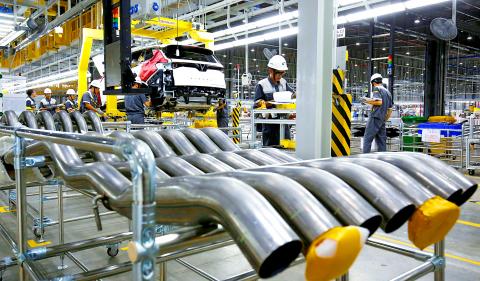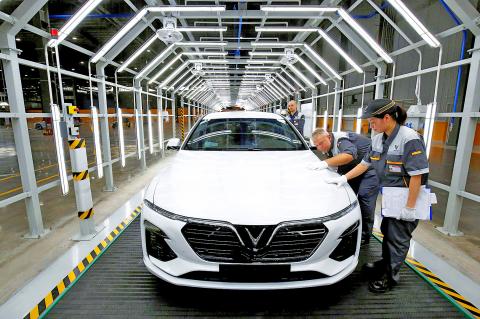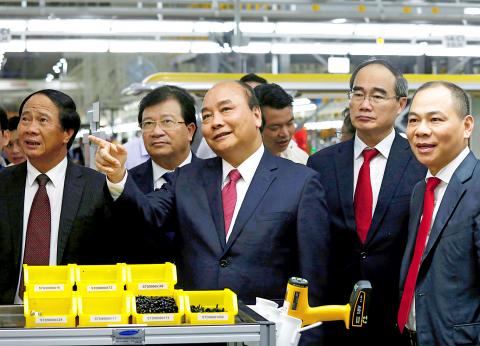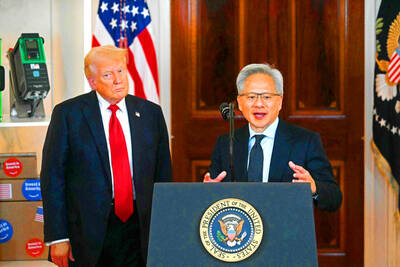Vietnam is getting into the car business with its own brand.
Real-estate conglomerate Vingroup JSC’s auto unit VinFast yesterday marked the rollout of its first vehicles from its assembly line, embodying the aspirations of the fast-developing country’s government to build a modern manufacturing sector.
“This makes a great contribution to the national economy,” Vietnamese Prime Minister Nguyen Xuan Phuc said in a speech during a ceremony at VinFast’s complex of six automated factories constructed in 21 months in the northern port city of Haiphong. “It affirms the [Vietnamese] Communist Party’s policy that the private sector is a very important driver of the economy. I want VinFast to go to the regional and global markets.”

Photo: Reuters
VinFast, which is to start delivering cars to customers on Monday, wants to be the first Vietnamese company to succeed at challenging foreign competitors such as Toyota Motor Corp, Ford Motor Co and Honda Motor Co in one of the world’s fastest-growing economies.
Xuan Kien Automobile, known as Vinaxuki, failed to win over brand-conscious Vietnamese with its local car models before folding in 2015.
The first VinFast rollout, a hatchback named Fadil, is initially priced at 394.5 million dong (US$16,900).

Photo: Reuters
Vingroup said in 2017 that it planned to invest up to US$3.5 billion in its auto business.
The company is also producing sedans, sport utility vehicles and electric motorbikes.
However, the company faces challenges in Vietnam’s aspirational culture.

Photo: Reuters
“Product quality is a concern” among consumers, said Truc Pham, a senior analyst at ACB Securities JSC in Ho Chi Minh City. “Vietnamese people favor foreign brands for high-value products. It will take years for customers to accept a new local brand.”
VinFast plans to make 250,000 vehicles during a first stage of operations, with projected production increasing to 500,000 vehicles a year by 2025.
The company said last year that it expects to begin exports in the middle of next year.
VinFast said it received 10,000 vehicle pre-orders a year ago.
Vietnamese purchased 119,497 new vehicles in the first five months of the year, an 18 percent jump from the year-earlier period, according to the Vietnam Automobile Manufacturers’ Association.
The vehicles are not completely made in Vietnam. The Fadil uses the chassis of the Karl Rocks model by PSA Group’s Opel. The sedan and SUV are built on frames from BMW AG, designed by Italian design house Pininfarina and have components engineered by Magna Steyr.
Jim Deluca, the former vice president of global manufacturing for General Motors Co, was hired as VinFast’s chief executive officer.
Vingroup embraced the government’s aspirations to see domestic manufacturers make high-value products for the nation’s growing middle class in an economy that has expanded at an average rate of 6.6 percent since 2000 — boosting annual incomes to almost US$2,600 from about US$400.

Taiwan Semiconductor Manufacturing Co (TSMC, 台積電) last week recorded an increase in the number of shareholders to the highest in almost eight months, despite its share price falling 3.38 percent from the previous week, Taiwan Stock Exchange data released on Saturday showed. As of Friday, TSMC had 1.88 million shareholders, the most since the week of April 25 and an increase of 31,870 from the previous week, the data showed. The number of shareholders jumped despite a drop of NT$50 (US$1.59), or 3.38 percent, in TSMC’s share price from a week earlier to NT$1,430, as investors took profits from their earlier gains

AI TALENT: No financial details were released about the deal, in which top Groq executives, including its CEO, would join Nvidia to help advance the technology Nvidia Corp has agreed to a licensing deal with artificial intelligence (AI) start-up Groq, furthering its investments in companies connected to the AI boom and gaining the right to add a new type of technology to its products. The world’s largest publicly traded company has paid for the right to use Groq’s technology and is to integrate its chip design into future products. Some of the start-up’s executives are leaving to join Nvidia to help with that effort, the companies said. Groq would continue as an independent company with a new chief executive, it said on Wednesday in a post on its Web

CHINA RIVAL: The chips are positioned to compete with Nvidia’s Hopper and Blackwell products and would enable clusters connecting more than 100,000 chips Moore Threads Technology Co (摩爾線程) introduced a new generation of chips aimed at reducing artificial intelligence (AI) developers’ dependence on Nvidia Corp’s hardware, just weeks after pulling off one of the most successful Chinese initial public offerings (IPOs) in years. “These products will significantly enhance world-class computing speed and capabilities that all developers aspire to,” Moore Threads CEO Zhang Jianzhong (張建中), a former Nvidia executive, said on Saturday at a company event in Beijing. “We hope they can meet the needs of more developers in China so that you no longer need to wait for advanced foreign products.” Chinese chipmakers are in

POLICY REVERSAL: The decision to allow sales of Nvidia’s H200 chips to China came after years of tightening controls and has drawn objections among some Republicans US House Republicans are calling for arms-sale-style congressional oversight of artificial intelligence (AI) chip exports as US President Donald Trump’s administration moves to approve licenses for Nvidia Corp to ship its H200 processor to China. US Representative Brian Mast, the Republican chairman of the US House Committee on Foreign Affairs, which oversees export controls, on Friday introduced a bill dubbed the AI Overwatch Act that would require the US Congress to be notified of AI chips sales to adversaries. Any processors equal to or higher in capabilities than Nvidia’s H20 would be subject to oversight, the draft bill says. Lawmakers would have